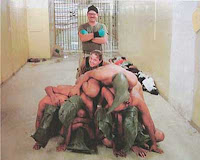 Anyhow... A couple of quick thoughts today about the Apple iPad and e-books, and specifically, how the iPad relates to e-books. I've had a few days to play around with Apple's "magical revolution" now, and have some impressions.
Anyhow... A couple of quick thoughts today about the Apple iPad and e-books, and specifically, how the iPad relates to e-books. I've had a few days to play around with Apple's "magical revolution" now, and have some impressions.In my review on CBC, I tried to put myself in the shoes of the people whom I believe to be the target market for the device - or Luddites who don't know much about technology. For these folks, the iPad could indeed be "magical;" it's like that other perfect piece of technology, the car, which you just turn on and it goes. For the gadget lover, it's also a pretty slick piece of hardware that's a lot of fun to use.
From the technologist's point of view, I've talked before about how the iPad - and everything it represents - is worrisome. It's very locked down and Apple pretty much calls the shots on what you can put on it, which are both facts that have many people concerned. Advocates of openness are worried that such a closed world could be the future of the internet.
I'm hopeful that the iPad, and Apple as a whole, eventually turn into a complement to the internet, and that they don't actually represent the future. I think it's fine if we can have open computers on which to create whatever we want, and iPads on which to consume those creations. I hope there's room for both and that it doesn't have to be either/or.
But onto those e-books. The iPad may be able to display digital books in full colour but it's inferior as an e-reader to devices like the Kindle and the Kobo. Those devices, of course, have e-ink displays that nicely replicate the look of a printed page, and they're really easy on the eyes. Reading off the iPad's LCD screen is pretty much like looking at a computer - there's glare and it gets hard on the eyes after a while.
How successful Apple will be in books therefore won't depend on the quality of its hardware, but what sort of payment system it sets up with publishers in the long run. Currently, the company is offering up the "agency" model where publishers set the price of the books sold, and they get to keep 70% while Apple gets 30%. There are many concerns about this system, not the least of which is that it could lead to price fixing.
But to get back to e-book readers... I suspect the market is going to firm up by the end of this year. The Kindle is superior for reading, but its $259 price tag is way too steep for a single-use device, especially considering the multi-purpose iPad starts at $500. Several months ago, I spoke with Michael Serbinis, the CEO of Kobo, which is the e-book division of Canada's big book chain Chapters/Indigo. At the time, he believed that single-purpose e-readers would get down to $100 by the end of this year. Since then, his company has introduced their own Kobo reader for $150, so we're almost there already.
The devices are clearly not where the money is to be made in e-books. It's like printers - HP will sell you one for $100, then make all their money off you on the inks. So if I can make a prediction, e-book readers - with rock-bottom prices - are going to THE hot gift this Christmas. There's going to be a lot of pressure, then, to sort out the whole e-book payment system with publishers.
And since we're on the topic... I've been asked many times when the e-book version of Sex, Bombs and Burgers will be coming out. It's actually the perfect book for an e-book because, as some people have remarked, they're too embarrassed to read it in public places because it has the word "porn" in the subtitle. E-books introduce privacy to reading, which is good for works like mine. Anyhow - Penguin has said there will be an e-book and I'm currently in the process of trying to get a concrete date from them. More on this soon - stay tuned.
And don't forget to channel surf tonight. Maybe I'll be on, maybe I won't?!?


















